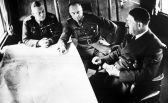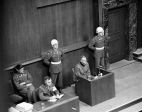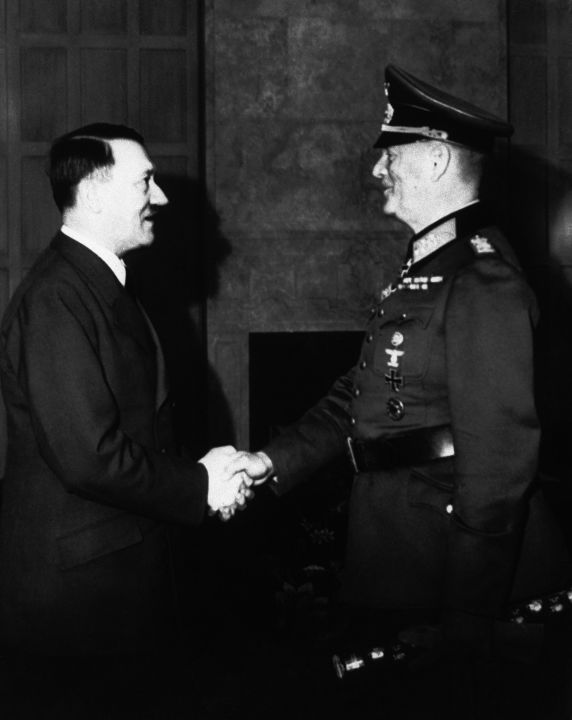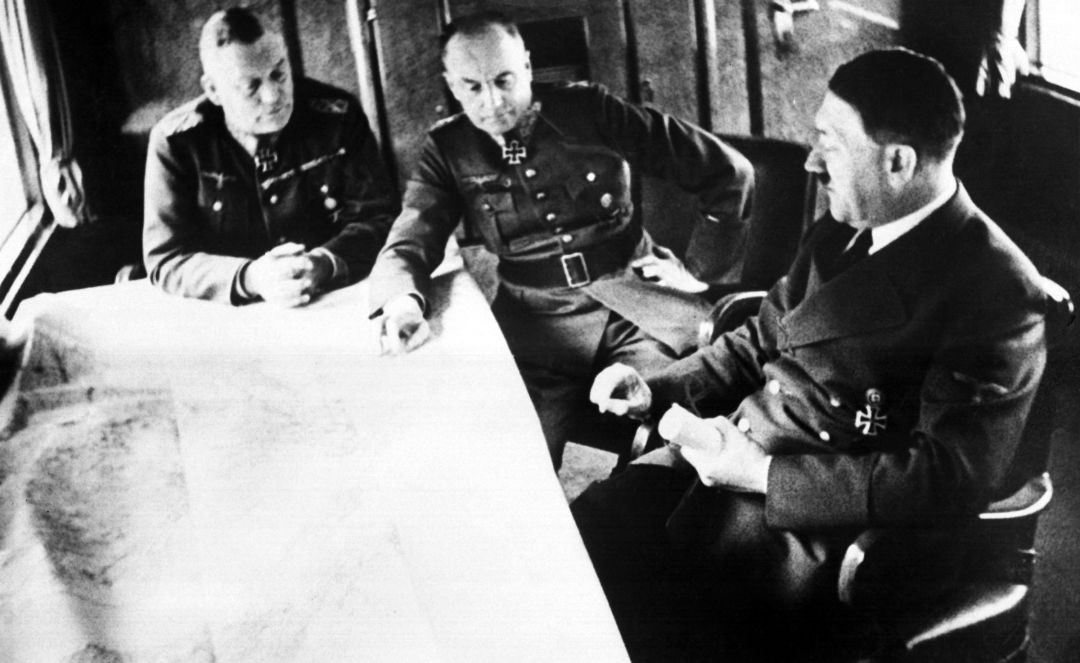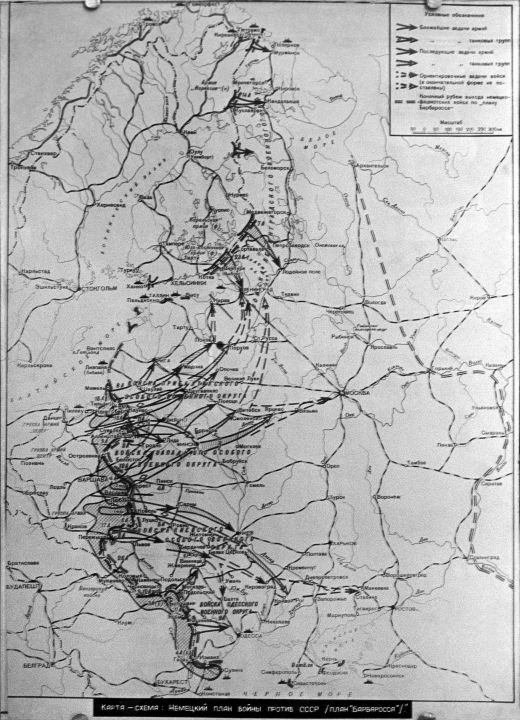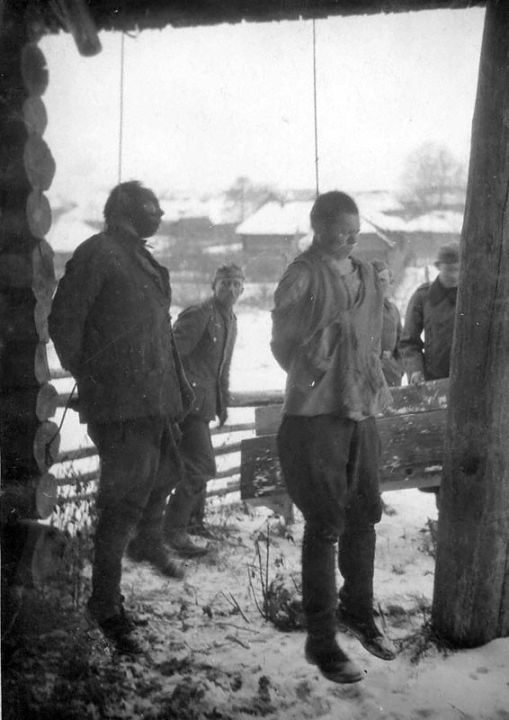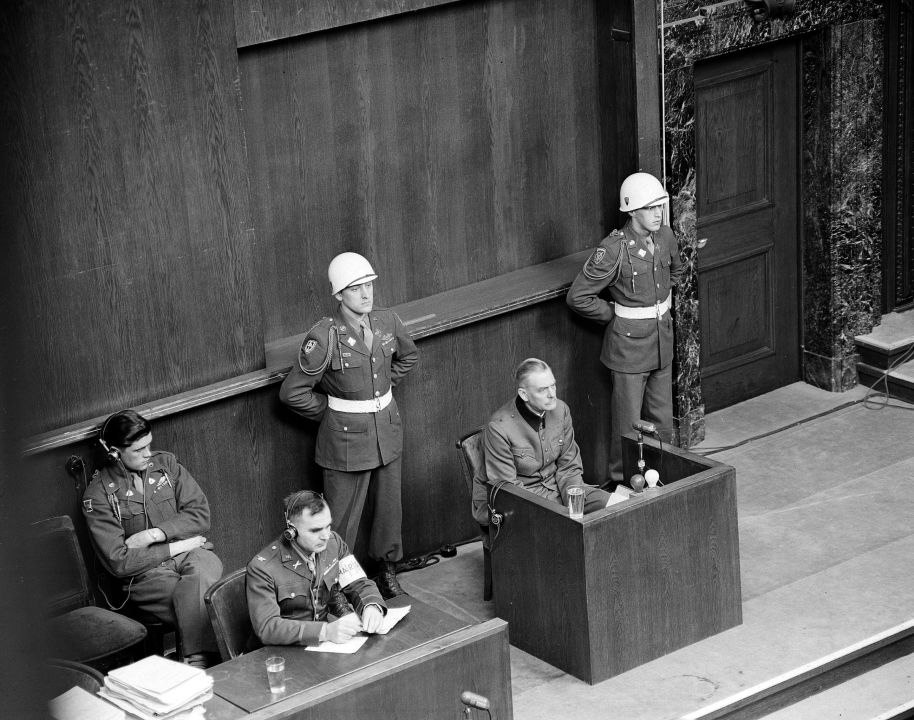Germany's Chancellor Adolf Hitler, left, congratulates Field Marshal General Wilhelm Keitel, chief of the Supreme Command of the Germany Army on completion of 40 years service in the German Army, in Berlin, on March 23, 1941.
3 April 1946
The questioning was conducted by Otto Nelte, Counsel for Defendant Keitel
"DR NELTE: Field Marshal Keitel, beginning with essential matters, I would like to put the following basic questions to you: What basic attitude did you, as a soldier, an officer, and a general, have toward the problems with which you had to deal in your profession?
KEITEL: I can say that I was a soldier by inclination and conviction. For more than 44 years without interruption I served my country and my people as a soldier (...).I did this with the same devotion under the Kaiser, under President Ebert, under Field Marshal Von Hindenburg, and under the Fuhrer, Adolf Hitler.
DR NELTE: What is your attitude today?
KEITEL: (...). It will not always be possible to clearly separate guilt and entanglement in the threads of destiny. But I do consider one thing impossible, that the men in the front lines (...) front should be charged with the guilt, while the highest leaders deny responsibility.
DR NELTE: (...) The prosecution, in presenting evidence regarding violations of the laws of war, crimes against humanity, repeatedly point to letters, orders, et cetera, which bear your name. (...)
KEITEL: It is correct that there are a large number of orders, instructions, and directives with which my name is connected, and it must also be admitted that such orders often contain deviations from existing international law. On the other hand, there are a group of directives and orders based not on military inspiration but on an ideological foundation and point of view (...)”.
4 April 1946
The questioning was conducted by Otto Nelte, Counsel for Defendant Keitel
"DR NELTE: When, did it become clear to you that Hitler was determined to attack the Soviet Union?
KEITEL: (...), during the first half of March a meeting of generals was called, that is to say, a briefing of the generals at Hitler's headquarters and the explanations given by him at that time clearly had the purpose of telling the generals that he was determined to carry out the deployment although an order had not yet been given. (...)This is Document 447-PS, and these are the directives which were eventually also signed by me. (…) Views were expressed there regarding the administration and economic exploitation of the territories to be conquered or occupied. There was the completely new idea of setting up Reich commissioners and civilian administrations. There was the definite decision to charge the Delegate for the Four Year Plan with the supreme direction in the economic field; and what was for me the most important point, and what affected me most was the fact that besides the right of the military commander to exercise the executive power of the occupation force, a policy was to be followed here in which it was clearly expressed that Reichs Fuhrer SS Himmler was to be given extensive plenipotentiary powers (...). I firmly opposed that, since to me it seemed impossible that there should be two authorities placed side by side. In the directives here it says: ‘The authority of the Commander-in-Chief of the Army is not affected by this’. That was a complete illusion and self-deception. Quite the opposite happened. (...) I think I ought to say that I have no witness to that other than General Jodl, who shared these experiences with me. (...) I had no authority whatsoever to give orders to them”.
5 April 1946
The questioning was conducted by Hans Laternser, Counsel for the General Staff and High Command (OKW)
"DR LATERNSER: Do you know of a single incident where Hitler ever consulted a military leader on a political matter?
KEITEL: No, that did not happen.
(...)
As a rule front commanders who were present were silent listeners in the general discussion of the situation; (...) and afterwards, according to circumstances, such commanders used to make a special report to Hitler about their respective areas. Then there was also an opportunity, as I believe was already mentioned by Kesselring, to discuss these things personally and to advance opinions. (…)
DR LATERNSER: What was the attitude of Hitler toward the General Staff of the Army?
KEITEL: It was not a good one. One may say that he held a prejudice against the General Staff and thought the General Staff was arrogant”.

